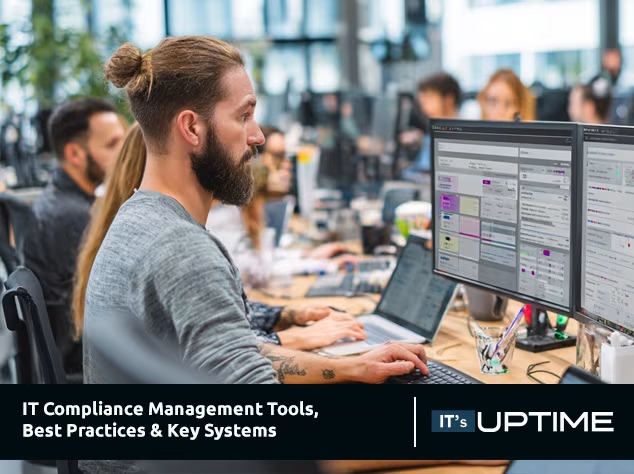Why Outsourcing IT Services Is the Best Decision for Your Business
George Grubor

.jpg)
If you’re a small to mid-sized business owner in Milwaukee, you know the frustration of dealing with constant IT-related issues. Slow networks, security breaches, and costly downtime can eat away at productivity, leaving you with more problems than solutions.
You didn’t start your business to troubleshoot IT problems or worry about the latest cybersecurity threats. But without reliable IT infrastructure management, your business may be at risk. That’s why many businesses are making the smart choice to outsource IT services to a trusted service provider—one that can keep your technology running smoothly while you focus on growth.

What are outsourced IT services, and how do they work?
Outsourced IT services involve handing over your IT functions to a managed services provider (MSP). Instead of struggling with tech support in-house, you get a team of experts dedicated to keeping your systems secure, optimized, and running smoothly.
Services can range from infrastructure management and cybersecurity to help desk support and cloud services. By outsourcing, businesses may leverage external expertise that ensures cutting-edge solutions, helping businesses reduce costs and mitigate cyber threats.
Benefits of outsourcing IT services for small to mid-sized businesses
Outsourcing IT isn’t just about fixing what’s broken—it’s about optimizing your entire IT environment. Here’s how it helps:
Reduce costs and improve efficiency
Hiring and maintaining an in-house IT team is expensive, requiring salaries, benefits, and ongoing training. Outsourcing IT services eliminates these overhead costs, offering a cost-effective alternative with a flexible, predictable pricing model, often based on a pay-as-you-go structure that fits your business needs. With this approach, you optimize IT expenses while gaining access to the latest technology without the financial burden.
Enhanced security and data protection
Cyber attacks, ransomware, and data breaches are growing threats to businesses of all sizes. An experienced service provider takes responsibility for safeguarding your business with advanced security measures, such as antivirus solutions, security audits, and disaster recovery planning. With a managed IT services provider, you minimize risks and ensure data protection.
24/7 help desk support and on-demand services
IT emergencies don’t stick to business hours. With outsourced IT support, you have help desk services available around the clock. Whether it’s troubleshooting software issues, handling system outages, or providing tech support, an outsourced IT support team gives you access to specialized expertise (including cybersecurity) without the overhead.
Scalability and flexibility to grow
Your business needs change over time. Outsourcing IT enables you to easily adjust IT resources based on demand. Whether you’re expanding your remote workforce, upgrading cloud services, or integrating mobile apps, a managed services provider ensures your technology scales with your business.
Strategic IT planning for long-term success
A reputable MSP doesn’t just fix problems—it helps businesses develop a proactive technology strategy. With expert advice from IT consultants, your organization’s CIO or decision-makers can align IT solutions with business outcomes, ensuring a competitive edge in the digital landscape.

What types of IT outsourcing are available, and which one is right for you?
Not all IT outsourcing solutions are the same—your ideal choice depends on your business size, industry, and technology needs. Here are the most common options:
Fully managed IT services
A comprehensive solution where a managed services provider takes full responsibility for your IT, from cybersecurity and help desk support to disaster recovery and infrastructure management. Ideal for businesses that want to offload IT completely.
On-demand IT support
Do you need IT help but not a full-time team? This flexible option provides tech support when you need it without long-term commitments.
Cloud services and infrastructure management
Businesses can leverage cloud platforms like AWS, Azure, and Office 365 to optimize operations, improve scalability, and reduce on-premises costs.
Cybersecurity consulting services
Cyber threats are evolving, and expert guidance helps safeguard sensitive data, prevent breaches, and ensure compliance.
On-site outsourcing
A third-party provider works directly at your location, managing IT operations hands-on.
Offshore outsourcing
IT tasks are handled by teams in other countries, often providing cost savings.
How to choose the right IT service provider
With so many IT companies claiming to be the best, how do you choose the right third-party partner for your business? The right provider should not only meet your current IT needs but also support your long-term business goals. Here’s what to look for:
Proven track record
Experience matters. Look for an IT service provider with a history of success. Check client testimonials, case studies, and online reviews to see how they’ve helped other businesses. A provider with industry-specific expertise is even better, as they’ll understand the unique challenges of your sector.
Comprehensive solutions
Your business requires more than just basic tech support. From help desk services and cybersecurity to disaster recovery and cloud solutions, ensure the provider offers a full range of services that align with your business needs. Having a single provider that can manage multiple aspects of your IT simplifies operations and enhances security.
Scalability
Your IT infrastructure should evolve with your business. Whether you’re expanding your workforce, adopting new technologies, or transitioning to a remote work environment, choose a service provider that can scale up (or down) as needed without major disruptions.
Transparent pricing
Hidden fees and unexpected costs can quickly add up. Opt for a provider that offers transparent, predictable pricing. A flexible pricing model—such as pay-as-you-go or tiered service packages—ensures you’re only paying for what you need while keeping IT costs manageable.
Industry experience
Your IT provider should understand your industry's compliance, security risks, and operational challenges. Industry-specific expertise ensures they can keep your business compliant and secure while addressing unique technology needs.
Strong customer support
Downtime is costly, so choose a provider with reliable, 24/7 help desk support. Fast response times and proactive system monitoring help prevent issues before they disrupt your business.

The next step to optimizing your IT infrastructure
If your business is struggling with IT issues, security concerns, or costly downtime, it’s time to explore outsourced IT solutions. Partnering with the right managed services provider can free you from IT headaches, reduce costs, and help your business thrive in today’s fast-changing digital landscape.
IT’s UpTime specializes in outsourced IT services for Milwaukee businesses, offering cutting-edge technology solutions to keep your operations running smoothly. Ready to take control of your IT? Let’s talk.
Frequently asked questions about IT outsourcing
What are managed services, and how can they benefit my business?
Managed services provide ongoing support and proactive IT management, helping businesses reduce operational costs and improve efficiency. A vendor offers services like cybersecurity, help desk support, and cloud management, allowing your in-house team to focus on core business operations.
How does software development fit into IT outsourcing?
Businesses may use outsourcing services for software development to create custom applications, automate workflows, or integrate third-party tools like ServiceNow. This approach ensures they get actionable solutions tailored to their needs without overburdening internal resources.
What role does a data center play in managed IT services?
A data center is essential for managing IT infrastructure, offering secure storage, backup solutions, and disaster recovery. Businesses use cloud-based or on-premises data centers to protect against data loss, ensure uptime, and optimize performance.
How do outsourced IT support services improve business continuity?
Outsourced IT support ensures businesses receive ongoing support, minimizing downtime and mitigating risks like ransomware attacks. IT providers offer best practices in security, backup solutions, and project management to keep your business running smoothly.
How does disaster recovery work with an outsourced IT provider?
A managed services provider implements disaster recovery strategies, leveraging online storage, backup systems, and strategic planning to prevent data loss. This is especially critical for businesses that rely on servers and cloud environments.
How can IT outsourcing support a remote workforce?
With a growing remote workforce, IT outsourcing helps businesses adopt support services, secure devices, and maintain business functions. Solutions like cloud computing, endpoint security, and RMM (Remote Monitoring and Management) ensure remote teams stay productive and secure.









